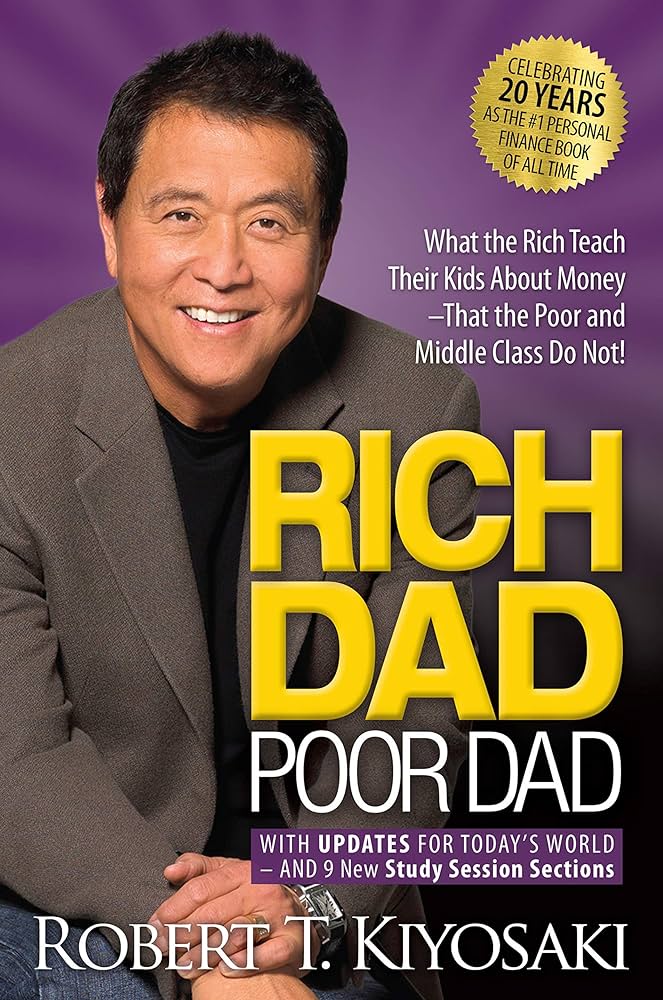"Rich Dad Poor Dad" by Robert Kiyosaki is a book that has garnered significant attention since its publication in 1997. It stands as a cornerstone in the realm of personal finance literature, offering a fresh perspective on wealth accumulation and financial independence. Kiyosaki contrasts the differing philosophies of his own "rich dad," his best friend's father, and his "poor dad," his biological father, to elucidate key principles for achieving financial success. In this review, we explore the insights presented in "Rich Dad Poor Dad" and assess its impact on readers' financial mindsets.
Key Themes and Insights
- Financial Education: One of the central tenets of "Rich Dad Poor Dad" is the importance of financial education. Kiyosaki emphasizes the necessity of learning about money, investing, and entrepreneurship outside the traditional academic curriculum. He argues that a lack of financial literacy can severely limit one's ability to build wealth and achieve financial freedom.
- Mindset Shift: The book advocates for a paradigm shift in how individuals perceive and approach money. Kiyosaki urges readers to challenge conventional beliefs about work and income, advocating for the pursuit of assets that generate passive income rather than relying solely on earned income from a job. This shift in mindset is fundamental to escaping the "rat race" and achieving financial independence.
- Assets vs. Liabilities: Kiyosaki introduces the concept of assets and liabilities as fundamental components of personal finance. He defines assets as items that put money in one's pocket, such as investments and real estate, while liabilities are things that take money out of one's pocket, such as consumer debt and excessive spending. Understanding this distinction is crucial for building wealth over time.
- The Power of Leverage: Another key principle elucidated in the book is the concept of leverage. Kiyosaki discusses how leveraging other people's time, money, and expertise can accelerate wealth creation. Whether through real estate investments, business ventures, or financial instruments, strategic use of leverage can magnify returns and propel individuals towards financial success.
- Financial Independence: Ultimately, "Rich Dad Poor Dad" advocates for achieving financial independence, wherein one's passive income exceeds their expenses, granting them the freedom to pursue their passions and live life on their own terms. Kiyosaki presents a roadmap for attaining this goal, emphasizing the importance of continual learning, taking calculated risks, and maintaining a strong financial IQ.
Critique
While "Rich Dad Poor Dad" offers valuable insights into personal finance and wealth creation, it has faced criticism for oversimplification and lack of practical guidance in certain areas. Critics argue that Kiyosaki's advice may not be universally applicable and that his emphasis on entrepreneurship and real estate investment may not align with everyone's goals or circumstances. Additionally, some have raised concerns about the accuracy of Kiyosaki's anecdotes and the lack of concrete evidence supporting his claims.
Conclusion
"Rich Dad Poor Dad" has undoubtedly left a lasting impact on countless readers, inspiring them to rethink their approach to money and embark on the path to financial independence. While it may not offer a one-size-fits-all solution to wealth accumulation, its core principles of financial education, mindset shift, asset accumulation, leverage, and striving for financial independence resonate with individuals seeking to improve their financial well-being. As with any financial advice, readers are encouraged to critically evaluate the concepts presented and apply them judiciously to their own circumstances. Overall, "Rich Dad Poor Dad" serves as a catalyst for personal finance empowerment, encouraging readers to take control of their financial destinies and build a brighter future.
Rating: 4/5
This rating reflects the book's significant impact on shaping readers' financial mindsets and its enduring relevance in the realm of personal finance literature. While not without its flaws, "Rich Dad Poor Dad" remains a seminal work that continues to inspire and educate individuals on their journey towards financial freedom.







